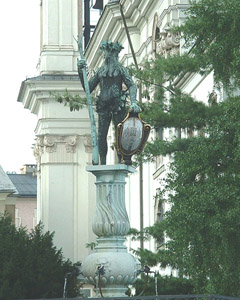As an American, I can recognize the value in a weakened Europe if its primary objective is going to be to undermine the U.S. in the world:One of the many wondrous peoples that poured forth from the rich imagination of the late J. R. R. Tolkien were the Ents. These tree-like creatures, agonizingly slow and covered with mossy bark, nursed themselves on tales of past glory while their numbers dwindled in their isolation. Unable to reproduce themselves or to fathom the evil outside their peaceful forest — and careful to keep to themselves and avoid reacting to provocation of the tree-cutters and forest burners — they assumed they would be given a pass from the upheavals of Middle Earth.....
Tolkien always denied an allegorical motif or any allusions to the contemporary dangers of appeasement or the leveling effects of modernism.... But the notion of decline, past glory, and 11th-hour reawakening are nevertheless everywhere in the English philologist's Lord of the Rings. Was he on to something?
More specifically, does the Ents analogy work for present-day Europe? Before you laugh at the silly comparison, remember that the Western military tradition is European. Today the continent is unarmed and weak, but deep within its collective mind and spirit still reside the ability to field technologically sophisticated and highly disciplined forces — if it were ever to really feel threatened. One murder began to arouse the Dutch; what would 3,000 dead and a toppled Eiffel Tower do to the French? Or how would the Italians take to a plane stuck into the dome of St. Peter? We are nursed now on the spectacle of Iranian mullahs, with their bought weapons and foreign-produced oil wealth, humiliating a convoy of European delegates begging and cajoling them not to make bombs — or at least to point what bombs they make at Israel and not at Berlin or Paris. But it was not always the case, and may not always be.
Alternatively, as someone who has enjoyed wandering about the old imperial cities of Europe, one must hope:Of course, we are amused by the spectacle. Privately, most Americans grasp that with a Germany and France reeling from unassimilated Muslim populations, a rising Islamic-inspired and globally embarrassing anti-Semitism, and economic stagnation, it is foolhardy to create 70 million Turkish Europeans by fiat. Welcoming in Turkey will make the EU so diverse, large, and unwieldy as to make it — to paraphrase Voltaire — neither European nor a Union. Surely Morocco, Algeria, and Tunisia will wish to get in on the largess. Were they not, after all, also part of the historical Roman mare nostrum, and did they not also enjoy long ties with France and Italy?
Now, for another reason I see something in the analogy, a statue I found in Salzburg:But gut-check time is coming for Europe, with its own rising unassimilated immigrant populations, rogue mosques entirely bent on destroying the West, declining birth rate and rising entitlements, the Turkish question, and a foreign policy whose appeasement of Arab regimes won it only a brief lull and plenty of humiliation. The radical Muslim world of the madrassas hates the United States because it is liberal and powerful; but it utterly despises Europe because it is even more liberal and far weaker, earning the continent not fear, but contempt.
The real question is whether there is any Demosthenes left in Europe, who will soberly but firmly demand assimilation and integration of all immigrants, an end to mosque radicalism, even-handedness in the Middle East, no more subsidies to terrorists like Hamas, a toughness rather than opportunist profiteering with the likes of Assad and the Iranian theocracy — and make it clear that states that aid and abet terrorists in Europe do so to their great peril.
So will the old Ents awaken, or will they slumber on, muttering nonsense to themselves, lost in past grandeur and utterly clueless about the dangers on their borders?

1 comment:
I would like to see an Ent.
Post a Comment